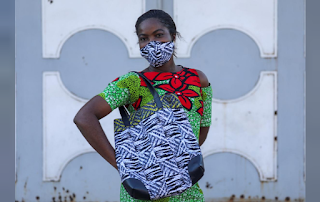Style-conscious Africans turn compulsory masks into fashion accessories
Nigerian fashion designer Sefiya Diejomaoh likes to wear bright, bold clothes to match her personality. She believes a global pandemic should not get in the way of her sense of style.
The mask she wears, which has become compulsory attire as Nigeria tries to stop the spread of the novel coronavirus, is the centerpiece of her ensemble. Gold-colored and studded with sparkling diamante jewels, it matches her floor-length dress.
"When you come out in a stylish mask or with an accessory such as this, it doesn't seem as though we're fighting a war. It seems more fun," said Diejomaoh, as she dresses at her home in Lagos to meet a client.
Many African countries have made it compulsory to wear masks in public to prevent the spread of the sometimes fatal COVID-19 respiratory disease.
Fashion lovers in the continent's biggest cities are combining style and safety by donning colourful masks, sometimes coordinating the fabric with their outfits.
The push to make masks stylish has taken off in other parts of the world. In places like Lebanon, businesses have switched from the production of furniture and clothing to striking masks.
In Africa, the trend is proving a boon to local tailors and designers who are making the masks.
Fashion designer Sophie Zinga, based in Senegal's capital, Dakar, said she decided to create masks from organic cotton after realizing that some form of protective clothing measures could be needed for the next two years.
"We are going to have to adapt and live with this virus," she said.
"As a fashion designer I think we are going to have to integrate each outfit with fashion masks," added Zinga, who created a digital platform, fashionfightscovid19.com, for the masks.
Far from Dakar, in South Africa's commercial hub of Johannesburg, upmarket leather accessories store Inga Atelier is creating masks.
In a country that has imposed some of Africa's most stringent lockdown measures and has been left reeling from the economic impact, the company's creative director said the move made sense.
"My business has been heavily affected in such a sense that the retail is on lockdown," said Inga Gubeka. "There was a big shortage, we realized, of masks that can be usable every day without having to throw it away."
Her company's masks combine leather with multicoloured fabrics including traditional South African Ndebele prints.
Back in Nigeria's Lagos, as she adjusted her glimmering gold mask before setting out into sub-Saharan Africa's most populous city of 20 million people, Diejomaoh said a small piece of fabric had become a way to express herself.
"People going around in surgical masks is depressing," she said. "I have to maintain status quo and who I am despite the situation."






Comments
Post a Comment